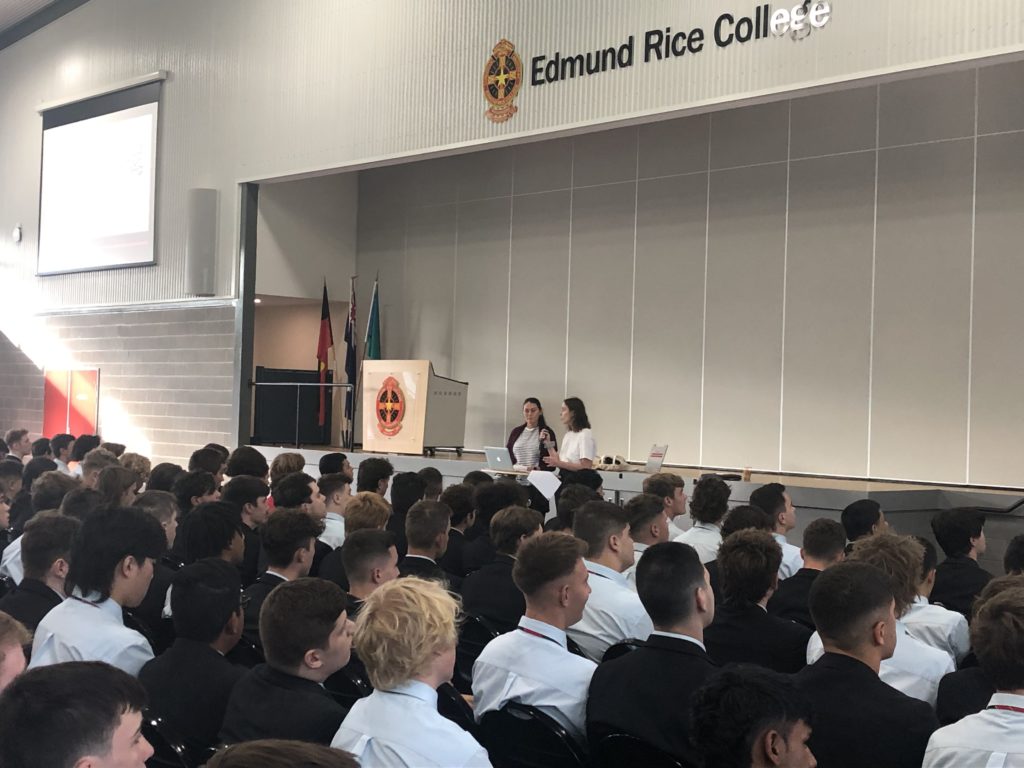At Edmund Rice College we believe and celebrate the fact that each and every person is made in the image of God and therefore deserves to be treated with respect and dignity at all times. We also recognise our dual responsibility as educators to address the growing concerns around the issue of consent evident in the media and the community by ensuring that we provide explicit and accurate information around consent.

On Tuesday 28th March the Year 11 and Year 12 cohort were lucky to have speakers from Youth Law Australia present to the students. Youth Law Australia is a community legal service that is dedicated to helping children and young people in Australia and their supporters to find a legal solution to their problems. Youth Law Australia were granted funding as a part of the National strategy to prevent and respond to child sex abuse. They were 1 of only 2 groups granted funding following the findings of the Royal Commission.
This presentation was extremely valuable for our young men to be a part of. This presentation included information on 3 key areas.
Youth Law Australia
Youth Law Australia provides free and confidential legal advice, assistance referrals to young people and their advocates. Anyone under the age of 25 (and their advocate) can request and receive free and confidential legal advice. This service can be accessed through online services and is available 24/7, so that young people can receive legal advice specific to their situation.
Consent
When discussing consent the YLA presenters began by introducing respectful relationships, how to maintain respectful relationships, respecting boundaries and signs of unhealthy relationships. They then went into great detail on the laws in relation to consent and the change in the laws in 2022 to include the affirmative consent laws. From there they broke down how to ask for consent and included both verbal and non verbal forms of consent. There was also information raised on the restrictions around the validity of consent and situations where consent is not given. In going through this information, the presenters also stepped the students through specific scenarios in order to demonstrate how these laws apply to real world scenarios.
Sexting
The presenters from YLA explored the topic of sexting, outlining to the cohorts the definition of what is classed as sexting. They then unpacked the laws that relate to sexting in regards to child abuse material and also the sharing of images without consent. This included going through the consequences if someone is found guilty of breaking these laws. In contrast to this, the presenters also gave the students information on how to help keep themselves safe online. The presenters then went through information on what young people can do, including the steps to follow if they are experiencing sexting extortion.
Overall this presentation was very valuable for our young men where they were able to discuss and ask questions about an extremely important topic in a safe space with qualified lawyers to give them clear information on the current laws that are in place.
If a young person or their advocate wishes to seek legal advice from YLA, they can do this by accessing https://yla.org.au/
Understanding sexual consent I believe is highly important for a number of reasons. It encourages positive interpersonal interactions and ensures that everyone’s boundaries are upheld. It helps in preventing sexual harassment and assault, it gives young people the confidence to express their own boundaries and comprehend the value of respecting those of others, it encourages open communication between partners and helps young people make informed decisions about their sexual health ensuring that young people understand the legal consequences of sexual assault. Overall I think all concepts were covered on Tuesday and I think we all learned the legal consequences and are better off with it. Rafael Johns-Murphy
Mr Bourke
Year 11 Pastoral Care Coordinator
